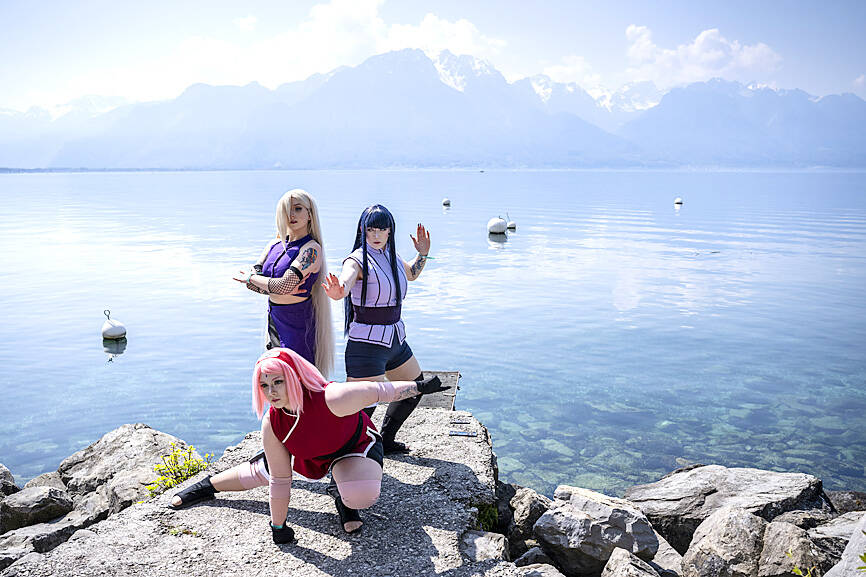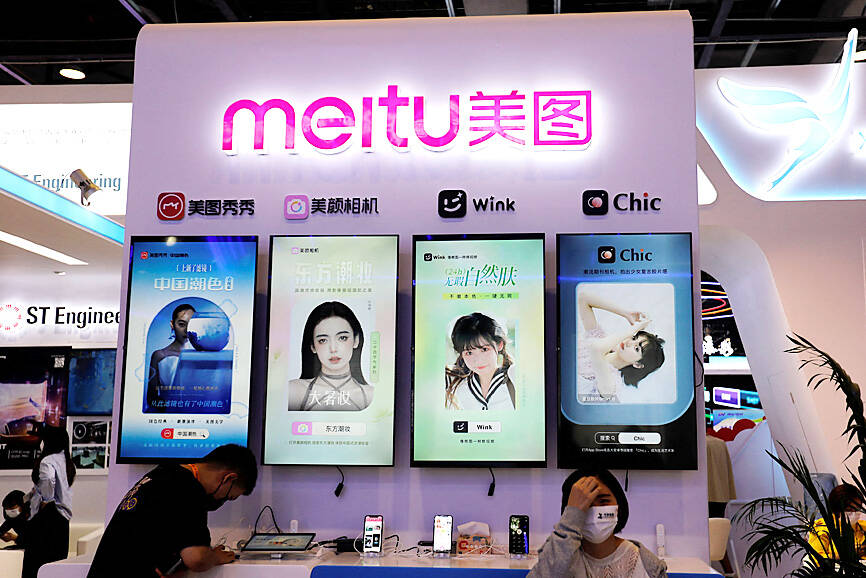The ability to turn a user’s selfie into an anime character has turbocharged an app developed by Meitu Inc (美圖) to the top of Japan’s download rankings over the past week, spurring a big jump in the Hong Kong-based firm’s shares.
Meitu is up more than 50 percent over the past couple of weeks, as its app reached the top of Apple Inc’s free iPhone downloads chart and No. 2 on Android’s Google Play in Japan, data.ai figures showed.
While not new to the Japanese market, the key novelty in the beauty app was the addition of the option to transform a photograph into an anime-style picture with the help of artificial intelligence (AI).

Photo: EPA-EFE
Meitu has been working on AI photo tools since 2017, and its work has begun to pay off with the anime-style selfies, which hit the market in China on Nov. 24 and globally three days later, Meitu CEO Wu Xinhong (吳欣鴻) said.
Since last week, the Meitu app has been among the top three most downloaded on Apple’s App Store in countries including the US, Brazil, Canada, Australia and New Zealand, Wu said.
Global downloads surged 79 percent in the week commencing Nov. 28, data.ai figures showed.

Photo: REUTERS
“We are seeing an explosion of AI-generated content and its huge potential,” Wu said. “It’s an unprecedented opportunity for us, a technological revolution.”
The use of AI to generate images has taken off in popularity this year with the launch of text-to-image systems such as Midjourney and OpenAI’s Dall-E. The technology is not without its controversy, but its appeal and accessibility have helped it proliferate.
Meitu’s approach differs, in applying a style transfer onto an existing image. The company also just introduced the option to add subtle animations — such as falling cherry blossom leaves — to its AI-generated anime avatars.
Japan has proven an eager adopter of this new trend.
University of Tokyo professor Fujio Toriumi said that 40 percent of hashtagged AI-generated images on Twitter since June have come from the country.
Torumi, whose work includes studying information-sharing on Twitter following the 2011 Tohoku earthquake and tsunami, collaborated with the Nikkei Inc to analyze the data.
“Japan has a culture of sharing manga on Twitter,” Toriumi said, adding that the novelty of using AI to generate similar pictures is “both a threat and a surprise” to that established audience, but many are embracing it out of curiosity.
“For most people, it’s a one-shot, but I think some will continue using it in unique ways,” Toriumi said.
At its peak, the AI art fascination was generating close to 80,000 Twitter posts per day out of Japan, although the current flow is about one-third of that, Toriumi said.
Still, he anticipates more new uses in the future, including AI-generated fashion models for clothes companies selling gear online.

Sweeping policy changes under US Secretary of Health and Human Services Robert F. Kennedy Jr are having a chilling effect on vaccine makers as anti-vaccine rhetoric has turned into concrete changes in inoculation schedules and recommendations, investors and executives said. The administration of US President Donald Trump has in the past year upended vaccine recommendations, with the country last month ending its longstanding guidance that all children receive inoculations against flu, hepatitis A and other diseases. The unprecedented changes have led to diminished vaccine usage, hurt the investment case for some biotechs, and created a drag that would likely dent revenues and

Macronix International Co (旺宏), the world’s biggest NOR flash memory supplier, yesterday said it would spend NT$22 billion (US$699.1 million) on capacity expansion this year to increase its production of mid-to-low-density memory chips as the world’s major memorychip suppliers are phasing out the market. The company said its planned capital expenditures are about 11 times higher than the NT$1.8 billion it spent on new facilities and equipment last year. A majority of this year’s outlay would be allocated to step up capacity of multi-level cell (MLC) NAND flash memory chips, which are used in embedded multimedia cards (eMMC), a managed

CULPRITS: Factors that affected the slip included falling global crude oil prices, wait-and-see consumer attitudes due to US tariffs and a different Lunar New Year holiday schedule Taiwan’s retail sales ended a nine-year growth streak last year, slipping 0.2 percent from a year earlier as uncertainty over US tariff policies affected demand for durable goods, data released on Friday by the Ministry of Economic Affairs showed. Last year’s retail sales totaled NT$4.84 trillion (US$153.27 billion), down about NT$9.5 billion, or 0.2 percent, from 2024. Despite the decline, the figure was still the second-highest annual sales total on record. Ministry statistics department deputy head Chen Yu-fang (陳玉芳) said sales of cars, motorcycles and related products, which accounted for 17.4 percent of total retail rales last year, fell NT$68.1 billion, or

In the wake of strong global demand for AI applications, Taiwan’s export-oriented economy accelerated with the composite index of economic indicators flashing the first “red” light in December for one year, indicating the economy is in booming mode, the National Development Council (NDC) said yesterday. Moreover, the index of leading indicators, which gauges the potential state of the economy over the next six months, also moved higher in December amid growing optimism over the outlook, the NDC said. In December, the index of economic indicators rose one point from a month earlier to 38, at the lower end of the “red” light.